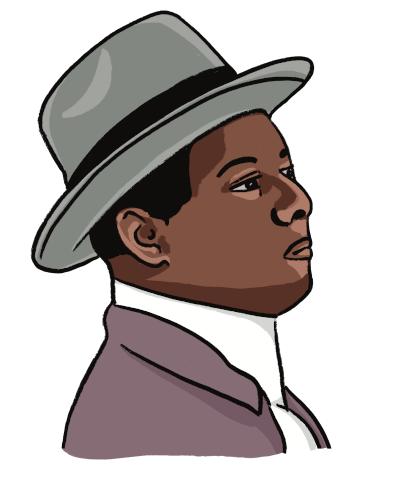
(May 14, 1897 – May 14, 1959)
Sidney Bechet was a soprano saxophonist, clarinetist, composer and innovator.
Bechet was born in New Orleans into a musical family. He was mostly self-taught in the early stages of his development, settling on the clarinet after trying several other instruments that were played by his parents and brothers.
At the age of six, he started to perform with his brother's band. As his skills developed he studied with many of the incredible musicians in New Orleans at the time, including Lorenzo Tio, the youngest of the Tio clarinet dynasty who mentored so many of the great early clarinettists. He also studied with cornettist Joseph "King" Oliver.
Bechet made seminal recordings with Louis Armstrong as part of pianist and singer Clarence Williams Blue Five records. Bechet's compositions "Wild Cat Blues" and "Kansas City Man Blues" were recorded in these sessions. The Blue Five recordings would have a big impact on the young Johnny Hodges, who cited the playing of both Bechet and Armstrong on these recordings as important early influences.
While on tour in London in 1919, Bechet discovered the soprano saxophone. He bought the instrument after happening upon it in a junk shop. He applied the techniques of clarinet playing to this new instrument, becoming one of the first influential saxophonists.
Sidney Bechet had a great impact on many other great musicians through his confidence and innovative playing style.
While working with Louis Armstrong, Bechet was the one of the first musicians to develop the swing feel in jazz, giving his playing that signature jazz lilt, and starting to transition the music away from the straight feel of earlier ragtime.
Bechet also worked with Duke Ellington for three months and had a significant impact on Ellington's writing techniques in his early period.
Bechet's influence on the development of the saxophone in jazz cannot be overestimed. His sound was one of the biggest in history, which influenced younger saxophonists nationwide through his extensive touring and recording work.
Chief among these was Johnny Hodges, who studied Bechet's playing on soprano. After hearing Hodges play soprano, Bechet later hired him to play in his band. Hodges would go on to apply the techniques he had learned from Bechet on the soprano saxophone to the alto, much as Bechet had done from the clarinet to the soprano ,which really began to cement the saxophone as the pre-eminent jazz instrument. His sound influenced the high register playing of many subsequent generations of alto saxophonists.